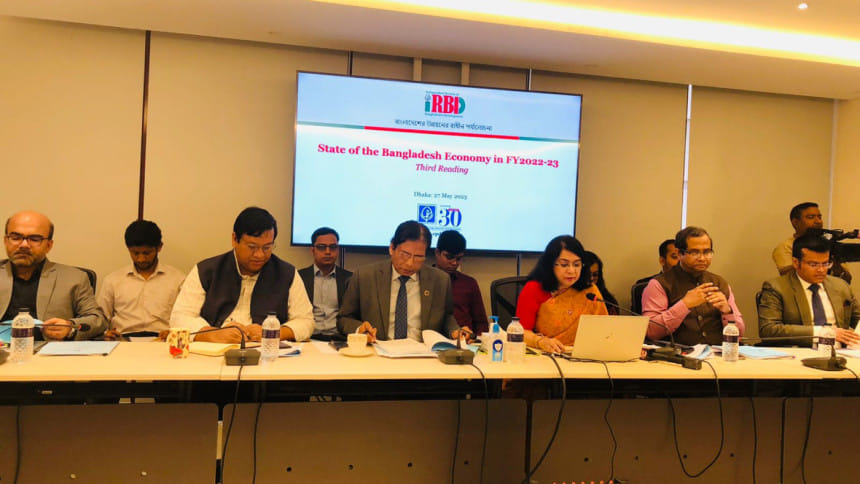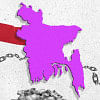Bangladesh economy at a crossroads

Bangladesh's economy is in its worst state in recent history, and the situation may worsen if the policymakers do not address the problems by employing the appropriate policy tools, the Centre for Policy Dialogue (CPD) said yesterday.
High inflation, slowing remittance and exports, falling forex reserves, lack of good governance, lax policy implementation, and inability to make necessary reforms are mainly responsible for the current economic crisis, the think-tank said.
"Bangladesh's economy is at a crossroads and going through the most difficult time in recent history," said Fahmida Khatun, executive director of CPD.
She made the remarks while presenting a review of the "State of the Bangladesh Economy in FY2022-23" at a press briefing at the CPD office in the capital's Dhanmondi.
Fahmida said many policies are now drawn up to protect the interests of influential groups and the policymakers should not do so.
Considering the current economic situation and the next budget to be presented on June 1, there is no doubt that the primary task of the policymakers should be restoration of macroeconomic stability, she said.
The policymakers should set targets for the macroeconomic framework for the upcoming fiscal year taking into consideration the current realities, said the CPD executive director.
"Mistakes committed during the preparation of the FY2022-23 budget -- that is setting the targets for the macroeconomic correlates in an unrealistic manner -- must not be repeated."
"Continued borrowing from the central bank will surely increase the money supply in the market, and subsequently would create inflationary pressure."
Fahmida said the government didn't set most of the economic targets, including for GDP growth, inflation, export, import, and remittance, in its budget for the current fiscal year due to the global economic turmoil and the Russia-Ukraine war.
"If the targets can't be set considering the reality, there will be a possibility of drawing up wrong policies," she said.
Mustafizur Rahman, a distinguished fellow at the CPD, said that the Bangladesh Bureau of Statistics had projected that the country would achieve 6.03 percent GDP growth in the current fiscal year, the lowest in 11 years except for the FY2019-20.
The government initially set a GDP growth target of 7.5 percent for this fiscal, but it was later revised to 6.5 percent.
The country's foreign exchange reserves have dropped to the lowest level in the last seven years, Mustafizur said.
The reserves stood at $29.96 billion on May 24 this year, down by 29.14 percent year-on-year.
He said that the government set an inflation target of 5.4 percent for this fiscal year, but inflation was a little short of the decade high of 9.52 percent in August last year.
Fahmida said, "Continued borrowing from the central bank [by the government] will surely increase the money supply in the market, and subsequently would create inflationary pressure."
The CPD said the government borrowed Tk 54,501 crore from the Bangladesh Bank until February this fiscal year.
According to media reports, borrowing from the central bank rose to Tk 74,393 crore until April, it said.
Borrowing from the BB may create gross new money of Tk 383,124 crore, but a comparison with global practice reveals that Bangladesh has surpassed all the thresholds of creating gross new money by a considerable margin, Fahmida said.
She said that the central bank did not even use its monetary tools to contain inflationary pressure.
The BB should have relaxed the interest rate cap of 9 percent on loans to tackle the high inflation, observed the CPD executive director.
The think-tank said Bangladesh Petroleum Corporation (BPC), the sole agency that imports and markets petroleum products, may make a profit of Tk 5 per litre from selling diesel and about Tk 13 per litre from octane at the current prices.
So, there may be an opportunity for the BPC to reduce petroleum prices between Tk 5 and Tk 10 each litre, it added.
The BPC's total profit in the last seven years (from FY 2015-16 to FY 2021-22) was about Tk 43,804 crore.
After paying Tk 7,727 crore as income tax, the BPC's net profit stood at Tk 36,074 crore during the same period.
Being a monopoly and state-owned enterprise, enjoying windfall gains by penalising the citizens of the country can't be justified, it said.
Khondaker Golam Moazzem, research director of the CPD, said, "Almost all economic indicators are in a bad shape. Policies adopted by the government to resolve the problems are not working. The government will get stuck if it continues adopting such policies in future."
In such a situation, the pressure on macroeconomy will increase further, he added.
For instance, the initiatives taken by the government to boost remittances or resolve the ongoing crisis in forex reserves have become ineffective, Moazzem said.
He said it is very difficult to bring back stability to the economy if a reform programme is not taken in the true sense.
Towfiqul Islam Khan, a senior research fellow, of the CPD also addressed the event.

 For all latest news, follow The Daily Star's Google News channel.
For all latest news, follow The Daily Star's Google News channel. 









Comments